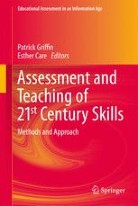
About this book series
This series introduces, defines, describes and explores methods of developing new assessment tools in educational and work environments which are increasingly characterised by use of digital technologies. Digital technologies simultaneously demand, reflect, and build student skills in many areas of learning, old and new. They can and will continue to adapt and facilitate the assessment of both traditional academic disciplines as well as those known as 21st century skills. These skills include creativity, critical thinking and problem solving, collaborative skills, information technology skills, and new forms of literacy, and social, cultural, and metacognitive awareness. The capacity of digital technologies to capture student learning as a process as well as student achievement is vast. New methods need to be developed to harness this capacity in a manner that can produce useful and accurate information to teachers for classroom interventions, and to education systems for policy development. The series includes innovative approaches to assessment in terms of their psychometrics and technology platforms; outcomes of implementation of assessments of generic skills at large scale in the classroom; and use of large scale assessment data to inform policy in education. The series explores the assessment of new and emerging skills required of graduates and how new forms of assessment inform teaching; it projects into the future the kinds of assessment possibility associated with technology and explores the assessment links between education and the workplace.
- Electronic ISSN
- 2363-6025
- Print ISSN
- 2363-5177
- Series Editor
-
- Patrick Griffin,
- Esther Care
Book titles in this series
-

-
Assessment and Teaching of 21st Century Skills
Methods and Approach
- Editors:
-
- Patrick Griffin
- Esther Care
- Copyright: 2015
Available Renditions
- Hard cover
- Soft cover
- eBook

-
Assessment and Teaching of 21st Century Skills
- Editors:
-
- Patrick Griffin
- Barry McGaw
- Esther Care
- Copyright: 2012
Available Renditions
- Hard cover
- Soft cover
- eBook

